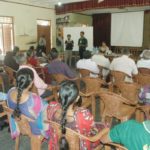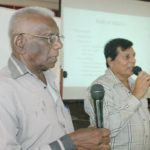One of the common social issues identified by many Diocesan (DC) Directors of Caritas Sri Lanka network is the problem of drugs, alcohol and tobacco addiction in the different communities which hamper the community empowerment, peace & reconciliation process. One of the unseen and unnoticed causes behind the violent incident that took place in the Kandy District in February this year resulting in the loss of lives and destruction of places of worship to which the Government had to declare a state of emergency was that the perpetrators were under the influence of drug and alcohol.
Cognizant of this, Caritas Sri Lanka-SEDEC (CSL) organized two workshops on “Education & Awareness on Drug/Alcohol Abuse for Conflict Prevention and Removing Obstacles to Community Peace and Harmony” – one in Batticaloa on 25 April for 65 participants and the second at Ratnapura on 27 April 2018 for 45 participants. This was part of the project titled “People Moving toward Reconciliation” supported by CAFOD, England.
The workshops were conducted by Mr. Freddie Jayawardena, Programme Manager of CSL who has gained 25 years of experience in working in the drug field covering all aspects of Drug Demand and Supply Reduction and trained by INL, U.S. Department of State under The Colombo Plan Programme.
Main Topics covered at the workshop were:
- An overview of Drugs
- Classification of Drugs by their effects
- Other types of substances used as intoxicants
- Stages of Drug/Alcohol Addiction
- Financial, Health & Social Consequences of Drugs, Alcohol & Tobacco
- Drug Control & Prevention measures
- Role of NGOs
In Batticaloa, an input session was held by Mr. A. Khalith, a representative of the National Dangerous Drugs Control Board, explaining the available services under their office.
In Ratnapura, Ven. Kuppiawatte Bodhananda Thero, Director, Mituru-Mithuro Drug Treatment & Rehabilitation Programme explained how by strengthening the unity within the family could help to curb the negative effects of drugs, alcohol and tobacco in the communities.
The main outcome was an attitudinal change among the members of Inter Religious Forums/Groups, youth and others who participated in the workshops and their commitment to take this message to others in their families and the respective communities.



